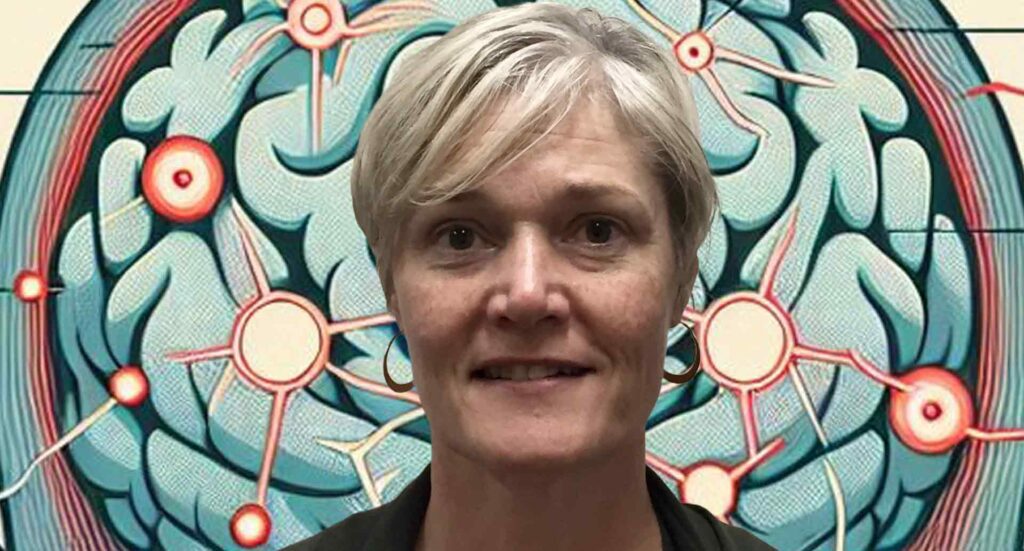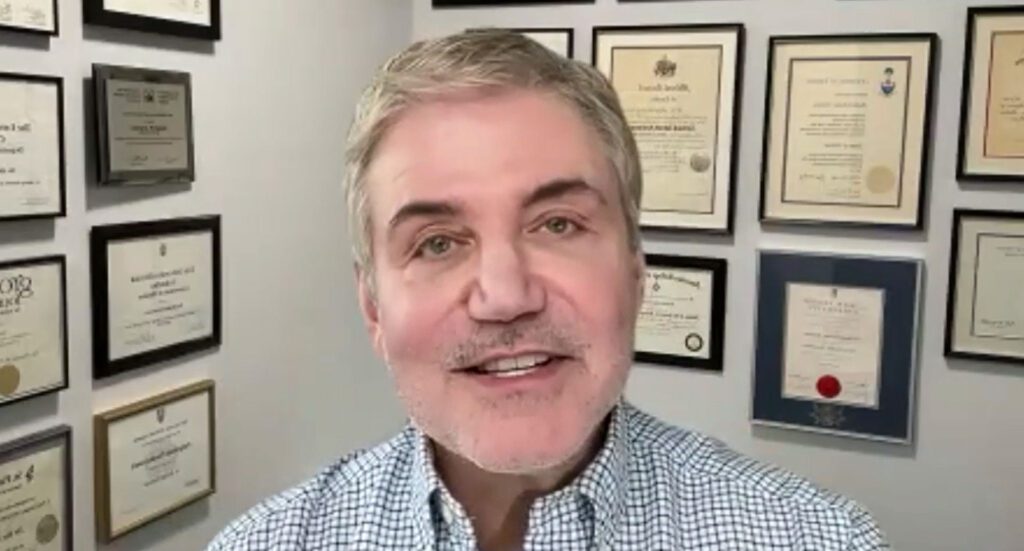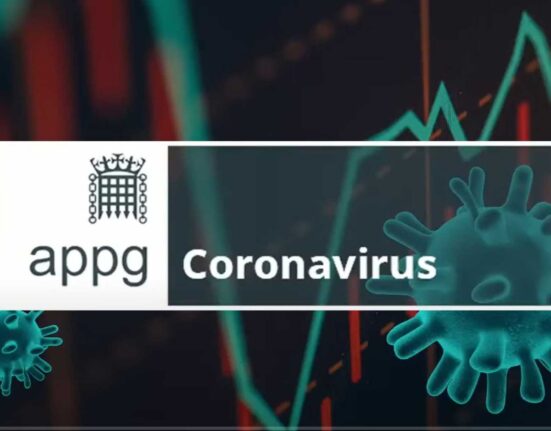Finding help for long COVID can be challenging. That’s why we’re here to make it easier.
Do you have a question about long COVID? Our team of world renowned long Covid healthcare experts are here to help.. By answering your questions each month surrounding topics, we hope to alleviate some of the uncertainty and provide clear, reliable guidance.
Check out our past month’s expert opinions below! Please ask questions for May 2025’s topic – Professor Erica Spatz.
This month, The Answers will be delivered by
Professor Erica Spatz, Cardiologist at CORE

Do you have unanswered questions about Cardiology and Long Covid? Please send in your questions about your heart and blood vessels in Long COVID to Professor Erica Spatz? Now’s the time to find out from the Experts!
Ask a Question
Ask Professor Erica Spatz our May Expert
Note: Our clinical Experts cannot provide a medical opinion on people’s personal medical history or personal Long COVID illness. They cannot provide a consultation online, by email or video to someone who is not their patient. Our Expert will answer general questions around the subject heading of the month that they are associated with.
Throughout April, The Answers are from
Professor Danny Altmann
Questions about IMMUNOLOGY & LONG COVID, answered by Professor Danny Altmann
Biomarkers for Mitochondrial dysfunction, Immune dysfunction/suppression, and auto-antibodies issues.
For someone with Long COVID (fyi currently mostly PEM symptoms at slight physical exertion), considering there are many possible potential sub-categories of Long COVID. Which biomarkers / tests would you recommend to conclusively determine whether someone with Long COVID suffers from one of the following issues?
– Mitochondrial dysfunction
– Immune dysfunction / suppression
– Auto-antibodies issues
What (exhaustive) tests would you recommend to conclusively confirm/eliminate each of these underlying pathophysiologies? (CLICK FOR ANSWER)
ALL GOOD AND IMPORTANT QUESTIONS, BUT, OUTSIDE OF A RESEARCH STUDY, ITS UNLIKELY THAT ANY CLINICIAN CAN OFFER YOU VALIDATED TESTS FOR THOSE UNDERLYING PATHOPHYSIOLOGIES. THE NEAREST ONE MIGHT GET IS YOUR QUESTION ABOUT AUTOANTIBODIES: SOME CLINICAL IMMUNOLOGISTS OR RHEUMATOLOGISTS ARE ABLE TO OFFER QUITE EXTENSIVE AUTOANTOBODY SCREENS, AS WELL AS SCREENS FOR IMMUNE SUBSET BY FLOW CYTOMETRY
I now know that Long COVID has done this, but HOW do I fix my critically LOW White blood cell count, including lymphocytes and monocytes and extremely HIGH Ferritin? Also blood pooling in my hands= intermittent red palms (microclots?). Drs here don’t have answers for me. Long COVID since mid-2023, semi resolved gut issues and other symptoms (fungal infections, fatigue, hair loss, brain fog) through diet and experimentation, but the chronic inflammation markers are causing me anxiety. Thank you (CLICK FOR ANSWER)
AS WE STILL DON’T REALLY HAVE AGREEMENT ON THE DRIVERS BEHIND THESE SYMPTOMS AND THERE AREN’T REALLY SYMPTOM-SPECIFIC SOLUTIONS, BEST HOPE MIGHT BE TO FIND SOMEONE DOING A TRIAL WITH ANTI-VIRALS, ON THE ASSUMPTION THAT THE DRIVER MAY BE PERSISTENT VIRUS
Hyperimmune response – I am nearly 4.5 years into Long COVID and have been bed-bound for the last few months.
I recently did an Attomarker test, which shows I have extremely high antibodies (20X upper limit of normal) to the alpha variant, my only COVID infection to date, plus very high antibodies to the Wuhan and Delta variants. (Last booster was 12 months prior to Attomarker test.)
I gather there are quite a lot of us in this ‘hyperimmune’ category, and am wondering about your thoughts on this, please? Given I am positive for spike in blood and exosomes, do you think that such high levels of antibodies could be indicative of the immune system fighting persistent virus or viral debris, or should such high antibody levels have cleared any persistent virus, suggesting the high antibodies are due to immune system overdrive?
Do you think patients in the hyperimmune category should be considering treatments to eradicate persistent virus (e.g. antivirals or monoclonals), or looking towards immunomodulatory treatments like low dose rapamycin or IVIG, or even removing excess antibodies e.g. with immunoadsorption or plasmapheresis? Thank you very much for considering this question
(CLICK TO VIEW ANSWER)
WE’VE LOOKED AT SPIKE AND NP ANTIBODIES ACROSS SEVERAL HUNDRED PEOPLE WITH AND WITHOUT LONG COVID, ACROSS DIFFERENT VARIANT INFECTIONS, AND DON’T SEE EVIDENCE FOR A CLEAR ROLE OF EITHER ABNORMALLY HIGH OR LOW ANTIVIRAL ANTIBODIES. HOWEVER, I DO AGREE THAT A PERSISTENT VIRAL RESERVOIR MAY BE A DRIVER, SO ANY CHANCE OF ENTRY TO A TRIAL WITH MONOCLONALS OR ANTIVIRALS WOULD BE WORTHWHILE.
There’s a lot of interest in how persistent spike protein may be continually stimulating our immune systems, but what do you think about persistent nucleocapsid (NC) as a therapeutic target? It’s linked to inflammatory cascades, tissue damage and coagulation, and I’ve read LC patients are less likely to make antibodies to NC, and that lower NC antibody levels correlate with more severe fatigue and lower chance of remission. Could it be that our immune systems aren’t producing sufficient antibodies to clear persistent nucleocapsid? What are your thoughts on this? Thank you for all of your amazing work (CLICK TO VIEW ANSWER)
WE’VE LOOKED AT SPIKE AND NP ANTIBODIES ACROSS SEVERAL HUNDRED PEOPLE WITH AND WITHOUT LONG COVID, ACROSS DIFFERENT VARIANT INFECTIONS, AND DON’T SEE EVIDENCE FOR A CLEAR ROLE OF EITHER ABNORMALLY HIGH OR LOW ANTIVIRAL ANTIBODIES. HOWEVER, I DO AGREE THAT A PERSISTENT VIRAL RESERVOIR MAY BE A DRIVER, SO ANY CHANCE OF ENTRY TO A TRIAL WITH MONOCLONALS OR ANTIVIRALS WOULD BE WORTHWHILE.
March Expert
Dr Thida Thant MD
Questions about ADHD & Long Covid

I’m struggling with executive dysfunction, making decisions, not pacing correctly, then struggling with PEM and fatigue. I’ve done testing with the neuroscience department at Groote Schuur hospital and passed with flying colours… I’m gathering my ADHD drove me to find it all so interesting that it covered my fatigue and no one believed that I was struggling. Next day I tried to switch my car off with the car radio… why does this fluctuate so much? (CLICK TO VIEW ANSWER)
Cognitive symptoms in Long COVID can fluctuate much the way you may experience your fatigue fluctuating with PEM and in fact could be considered part of your PEM. As you and many other people may have experienced, physical and/or cognitive exertion or stress can trigger a worsening of your symptoms, including attention and concentration. The triggering event does not necessarily need to happen right before your symptoms suddenly worsen, but often is something that occurred hours to 1-2 days prior to the “crash”. Pre-existing ADHD can worsen this cycle, though as I discuss in some of my other answers this month, Long COVID can also cause a “secondary” ADHD type clinical picture with similar symptoms. While many patients do experience improvement over a few years, it can also be helpful to regularly engage in treatment to focus on pacing, cognitive rehabilitation and medication and behavioral strategies to manage Long COVID cognitive and/or ADHD symptoms as it can be challenging to consistently implement compensatory strategies and techniques.
How is it possible that I now have ADHD when before I did not. The short term memory loss? Literally will have no recollection of something especially moment to moment. Two Neuropsych testing 3 years apart and ADHD is DX. I think I have brain damage from Covid. Do you think a Pet Scan would show if I have the damage to put my mind at ease? I am not the same person. Thanks.(CLICK TO VIEW ANSWER)
There are a few possibilities:
1) Some patients have either undiagnosed or very mild ADHD prior to developing Long COVID. For many of these people, the inattention was not very disruptive or impairing, and they had developed many compensatory strategies that had been working very well for them. Some of these strategies include making and using lists, organizational phone apps or planners or navigating their way into work environments that allowed them to adjust their schedule or approaches to align with their ability to focus and complete tasks. For people in this category, once they developed Long COVID, the severity of their ADHD worsened due to the additional burden of the attention, concentration, mental fatigue and brain fog we so
commonly see. As a result, sometimes the strategies they had developed over their life or the medications they had been taking, were no longer adequate to manage their symptoms.
2) For other people, the attention, concentration, mental fatigue and brain fog they developed as part of Long COVID can look very similar to ADHD. While ADHD is a neurodevelopmental disorder that usually manifests in childhood (even if the child is able to perform well academically), the idea of a “secondary” or “acquired” ADHD type syndrome is not new and has been seen in other medical conditions such as traumatic brain injury (TBI) or obstructive sleep apnea (OSA) or following the use of medications like some chemotherapy or substances such as cannabis. Due to this, many people suffering from Long COVID can look like they have ADHD and can benefit from many of the same behavioral strategies, therapy techniques and medications as those with a more classic form of ADHD. Reassuringly, many people’s cognitive symptoms from Long COVID do improve with time, treatment of contributing disorders and factors (such as depression, OSA and/or sedating medications) and things like cognitive rehabilitation through occupational or speech-language therapy.
Regarding your question about PET scans – while studies have shown that some Long COVID patients can exhibit abnormalities on PET scans, some have also found that about half of patients have “normal” scans, limiting the utility of this test. Whether you have always had ADHD which has been brought to light by Long COVID or whether you developed secondary ADHD or cognitive dysfunction from Long COVID, the strategies mentioned above are currently the most helpful and accessible while further research is ongoing. Additional strategies such as low inflammation diets and supplements, medications such as low dose naltrexone and ADHD medications can also be considered and discussed with your healthcare team.
Before long Covid I was in education and was a Type A personality. I was very organized, everything had to be planned out, and I was even a bit OCD about things. Now, I am the complete opposite….very go with the flow, can’t remember anything, and can’t concentrate on things (banking, reading a book, following multistep instructions, and anything regarding memory skills.) How did this happen? I feel like I went from one extreme to the other and would honestly, love to meet in the middle. (CLICK TO VIEW ANSWER)
Your report of memory and concentration changes are very common in people with Long COVID. Many times, people with Long COVID can develop brain fog (difficulty thinking or concentrating), problems with reasoning, working memory, problem-solving, word retrieval
and attention. A multidisciplinary approach can be helpful – meeting with a healthcare provider to rule out other contributing factors (medical conditions like obstructive sleep apnea, medications or supplements that can worsen alertness and focus, psychological/psychiatric conditions like significant anxiety or depression) and working with an occupational or speech-language therapist on cognitive rehabilitation and compensatory strategies. Though there is still investigation ongoing into the differences between more classic ADHD that develops in childhood versus the cognitive and attention changes from Long COVID, many times therapy strategies that help people cope with and manage ADHD can be helpful for Long COVID patients facing these struggles for the first time.
It is harder to know how personality changes fit with Long COVID. It is possible that this may reflect you adapting to your current level of ability in terms of planning and organizing and could be serving as a way to have less emotional distress in response to your cognitive changes. It could be worth reflecting on or working with a therapist to see how the change from a more Type A personality to “go with the flow” has impacted your life and to determine if it’s a positive or negative change or simply a change.
I’ve had Covid three times and am now finding it very difficult to concentrate on tasks and am stuck on fast-forward. For example spending more than a minute on a task and my mind wanders to the next task or I’m easily distracted with any tiny movement or noise. When involved in a work conversation, I end up over-talking coworkers to get my point across.
I can’t seem to wait anymore and I’m noticing it more frequently. It’s embarrassing.
I don’t want to take medications, however I’d love to be able to focus again. ADHD is driving me crazy. What can I do? (CLICK TO VIEW ANSWER)
While ADHD is classically characterized as a neurodevelopmental disorder that usually manifests in childhood (even if the child is able to perform well academically), the idea of a “secondary” or “acquired” ADHD type syndrome is not new and has been seen in other medical conditions such as traumatic brain injury (TBI) or obstructive sleep apnea (OSA) or following the use of medications like some chemotherapy or substances such as cannabis.
Due to this, many people suffering from Long COVID can look like they have new-onset ADHD and can benefit from many of the same behavioral strategies, therapy techniques and medications as those with a more classic form of ADHD. If preferring to avoid stimulant medication, there are other types of medications (alpha agonists such as
guanfacine and clonidine) that can be helpful for hyperactivity and impulsivity. Reassuringly, many people’s cognitive symptoms from Long COVID do improve with time, treatment of contributing disorders and factors (such as depression, OSA and/or sedating medications) and things like cognitive rehabilitation through occupational or speech-language therapy, though recovery can be prolonged if experiencing recurring COVID infections.
Some good places to start in learning more about ways to manage ADHD type symptoms: ·
https://chadd.org/understanding-adhd/adhd-fact-sheets/
· https://add.org/start/adda-resources/
How do you differentiate new onset (post-covid/long covid induced) ADHD vs. LC brain fog/inflammation symptoms that could be mimicking ADD symptoms but not necessarily be ADD? How do you tell the difference? Could new onset development of ADHD with LC be due to a genetic predisposition where the virus triggers some epigenetic change? I have not had ADHD symptoms until LC, my brother has had ADHD his whole life. So wondering if it’s possible for some genetics to be “dormant” until a switch is flipped triggering it to become active/new development of ADD. Is this possible? (CLICK TO VIEW ANSWER)
It can be difficult to differentiate between the two and certainly we know that there is a genetic component to ADHD. It is certainly possible that long COVID may serve as the second “hit” in the 2 hit hypothesis but this is not clearly proven at this time.
“Adult onset” ADHD is currently a controversial and complicated topic which is outside the scope of this segment, though remains under investigation.
Currently, ADHD is considered a neurodevelopmental disorder, meaning that onset actually occurs in childhood and continues throughout one’s life, even if someone does not experience negative consequences like poor grades. Some people have either undiagnosed or very mild ADHD prior to developing Long COVID that was not disruptive or impairing, leading to a delay (or lack of need for) a formal diagnosis.
This differs from people that did not experience or exhibit any symptoms of ADHD prior to their COVID infection and only developed symptoms afterwards. For these people, we
often diagnosis them as having brain fog and other cognitive issues due to long COVID, even though they can look very similar to people with more classic ADHD. As I discuss in my response to one of the other questions, “secondary” ADHD type clinical pictures are not uncommon or new and may be a better fit for many people with long COVID.
Differentiating between the two requires a detailed evaluation by an experienced mental health provider that can help collect information from throughout your life (often including reports from people around you like parents, siblings or partners) in addition to assessing your current symptoms. Neuropsychological testing can be helpful but is not required to make an ADHD and/or long COVID diagnosis. Popular attention tests, many computerized or available online, can help identify current attention and concentration issues, but on their own, are not adequate to diagnosis ADHD or differentiate it from long COVID associated cognitive changes.
——————————————–
Useful Resources and Additional Readings:
· https://www.gavi.org/vaccineswork/could-long-covid-brain-fog-be-acquired-form-adhd
· https://www.yalemedicine.org/news/how-to-manage-long-covid-brain-fog
· https://pmc.ncbi.nlm.nih.gov/articles/PMC10121130/
· https://www.ancor.org/connections/long-covid-complications-in-neurodiverse-populations/
· https://jnm.snmjournals.org/content/65/supplement_2/242351
Explore Previous Long COVID Questions:
Ask a Long COVID Question for this month’s expert:
February Expert
Dr David Lyons Kaufman MD – CHRONIC PAIN

Dr. David Lyons Kaufman MD. Dr. Kaufman completed his medical training at New York Medical College in the U.S.A. He began his internal medicine practice in Greenwich Village in New York City just as the HIV-AIDS epidemic exploded.
As a result, he became deeply involved in the care of HIV positive patients, and in the research aimed at discovering ways to treat both the opportunistic infections they were dying from and the virus that was causing the destruction of their immune systems. As HIV-AIDS became a treatable chronic infection, the practice expanded to include more primary care and general internal medicine patients, and as a result, Dr. Kaufman became involved in the diagnosis and treatment of a variety of chronic and often difficult to diagnose and manage conditions such as tick-borne infections,, hepatitis B and C, fibromyalgia, ME/CFS, and other complex chronic diseases. Dr. Kaufman is a working member of the U. S. Myalgic Encephalomyelitis / Chronic Fatigue Syndrome or ME/CFS Clinical Coalition and part of the guideline committee.
He is a founder and practicing physician of the Center for Complex Diseases based in Seattle and California, U.S.A, which has a focus on patients suffering from complex chronic disease such as Mast Cell Activation Syndrome, ME/CFS and Long COVID.
February Long Covid Questions | Unresolved and Chronic Pain:
I have had COVID 4 times, last time was Feb 2024…each time having a pressure like pain around the bottom 3rd of my ribs……almost like there’s a tight elastic band around that area.
Now with Long COVID that pain returns (sporadically for days to weeks) every month or so.
As times goes on it is less frequent but when it comes its intensity remains unchanged.
What is it from?? How do I lose it? (Click to view answer)
Repeated episodes of COVID and progression to Long COVID can cause problems with blood clots, so called ‘microclots’. These clots can cause decreased blood flow, and this can present as pain though this seems somewhat less likely if this problem only happens sporadically. This may also be from residual/latent COVID virus particles that become more active/activated. To understand more, you would need to partner with a physician who would need to take a detailed history and explore questions such as – when does it occur? Any relation to position or exercise? Does anything make it worse or better when it is happening? What other Long COVID symptoms / problems do you have?
I have constant leg aching with my Long COVID. The more I do in a day the worse it gets. As it gets worse than my legs get weaker, and I have difficulties even walking any distance. I am taking magnesium citrate, and it seems to help a bit, but certainly does not resolve it. I wonder if there’s other supplements etc. I could try? Thank you (Click to view answer)
There are many possible causes for this kind of pain. The fact that you use the word ‘weaker’ and that it gets worse with increased distance is very important, and of course there may not be one cause. First thing to consider since it is easy to diagnose, and treat is vitamin B12 deficiency. This can occur for many reasons such as a vegan or vegetarian diet, medicines like birth control pills and metformin, small intestine bacterial overgrowth, and abnormal autoantibodies. Another possible cause could be hypoperfusion to your muscles caused by POTS. I would suggest doing a NASA Lean test as an easy quick way to check for this, with someone present as you can become unwell when doing the test. These symptoms can also be related to dysautonomia and impact on muscle function. Often pyridostigmine can help and might be worth a trial. Finally, this could be related to small fiber neuropathy which often causes the pain/ache but less likely to cause the muscle weakness. It certainly, would be reasonable to trial Low Dose Naltrexone (LDN) which can help with the pain and modulate the immune system, decreasing autoimmunity. Please trial these medications under a qualified and registered physician such as your Family Physician.
I can only stand 10 minutes before the burning pain in my thighs begins. I have tried salt increase and compression. I also have many signs of SFN (small fibre neuropathy). Is there testing I can request? Lactic acid? Oxygen? SFN specs? Anything to be moving forward (Click to VIEW Answer)
This could be from hypoperfusion and POTS especially if it happens only with standing. I would advise a NASA Lean test for at least 10 min, preferably 15, and you may be able to actually correlate the start and increase of the pain with the changes in blood pressure and heart rate. Please do this with another person present, in case you become unwell. It could be SFN, though usually that would also cause symptoms at rest. This is usually diagnosed with a simple punch biopsy/skin biopsy on the leg. I doubt measuring lactic acid or oxygen will help. Does the pain also occur when you are active, walking, climbing stairs? If yes, that may again be caused by POTS and hypoperfusion, but also dysautonomia affecting muscle function. Discuss with your physician a trial of LDN and pyridostigmine which might be helpful.
I got COVID(CV) in March 2020. Never hospitalized or tested for CV because I didn’t fit the criteria, and they were rationing tests. I was told verbally I had CV. When I didn’t recover, they kept telling me everything was fine. I told the Drs my lungs felt permanently damaged, and they said my lungs were fine when listening with a stethoscope (no tests). I still have a chronic cough, and I cough up phlegm every day. I still experience shortness of breath on occasion. My voice also gets hoarse, and my throat gets sore if I talk for any length of time or sometimes no reason at all so I’m always carrying throat lozenges. Is there anything I can do to resolve these issues? Thank you! (Click to view answer)
Clearly you need a more aggressive workup for this. I would advise that you see a physician who is willing to do the following – a chest xray, CT scan of the chest, pulse oximetry. I would also advise looking for infection since EBV reactivation is very common with and after COVID. I would also do antibody testing for Chlamydia (respiratory not the STD) and mycoplasma. I have seen both of these as a cause for persistent pulmonary symptoms, cough, shortness of breath, and sputum production.
Chronic long-standing hoarseness should probably be examined by an Ear, Nose, Throat specialist with an endoscope to visualize and check the vocal cords. Unfortunately, I cannot make suggestions regarding how to resolve this without a better workup and understanding of what is going on. That said, it would seem to me very reasonable to treat with a course of azithromycin which would cover many of the possible infections, and of course, if the labs revealed EBV reactivation, then I would treat with an antiviral. Again, any investigations or treatments should be initiated by a qualified and registered physician that is licensed to practice in your area/country.
When a person has Mast Cell Activation Syndrome (MCAS) it’s hard to decipher which pain is from MCAS and which breathlessness or pain is related to Long COVID, I’m not exactly sure how to pose my question regarding MCAS and Long COVID regarding pain but could you elaborate on any findings regarding this because the pain can move around to different areas and joints and also result in some moderate swelling.Thanks (Click to view answer)
Long COVID (LC), like ME/CFS, is a label. It really tells us nothing about underlying causes for all the symptoms, problems and disabilities that people suffer from. MCAS can occur as a result of COVID and be part of the pathology that makes people with LC sick. It can cause pain everywhere and anywhere and often be very confusing since it can be difficult to know what the triggers for mast cell degranulation are. The swelling would also support the likelihood that the pain is from mast cell activation. With the supervision of a qualified and fully licensed physician I would manage this with a slowly escalating introduction of medications to block histamine receptors and stabilize mast cells, e.g. cetirizine and famotidine (histamine 1 and 2 receptor blockers), plant flavonoids like quercetin and luteolin and then prescription meds like ketotifen and cromolyn. Long Covid of course can also cause dysautonomia, POTS, SFN, all of which can cause pain so these conditions should be considered and tested for if there is no benefit with MCAS management.
I have unresolved nerve and joint pain as a result of suffering from Long COVID since 2020. In addition to care from my primary care doctor, what kind of specialist is best suited to treat this pain and how? (Click to view answer)
Ideally, neurology and rheumatology should be helpful but too often these specialists are not ‘tuned into’ the Long Covid world which is very frustrating. The pain might be caused by MCAS, SFN and POTS. It can also be from connective tissue disorder (hEDS) that has progressed/worsened as a result of the chronic inflammation from COVID/Long COVID. Your primary care doctor should be able to check for POTS with a NASA Lean test and could order or perform a skin biopsy for SFN, and labs for MCAS. Regardless of lab results I would certainly consider a trial of mast cell meds such as antihistamines, famotidine, quercetin, and luteolin. Your primary care doc can also prescribe low dose naltrexone which can often be a game changer for this kind of pain.
Since I got COVID in Nov 2021, I constantly have aches and pains in my arms and legs. The legs feel like they are on fire sometimes and it’s difficult to walk. LDN doesn’t seem to be helping. Any suggestions? (Click to view answer)
Please see my other answers above regarding this kind of pain. A biopsy to look for SFN would be very appropriate. Also as mentioned above, it is important to check for B12 and folate levels. If no answers then I would do a workup for autoimmune causes of pain checking the different autoantibody panels including ANA, early Sjogren’s, Rheumatoid Arthritis and others. If LDN had some benefit under the supervision of your primary care doctor you could trial higher doses above the usual 4.5 mg by slowly increasing in 1mg increments every few days to see if you note a decrease in pain.
Hi, I have been a Long Hauler for since July 2022. I have chronic headache pains lip inflammation and now puffy dark eyes it feels like fluid in my face. What causes swelling if all other tests have been ruled out? Can headaches cause facial swelling? Thanks (Click to view answer)
Again, this is very suggestive of Mast Cell Activation Syndrome. Even if labs have been negative (histamine, tryptase, chromogranin A, prostaglandin D2) with the supervision of your Primary Care Physician I would suggest a trial of meds as described above. Keep in mind that trial means exactly that so if one antihistamine doesn’t work sh/e could try another. Also important to note, that usually one needs doses 2-4 times higher than what the bottle says. I do not think headaches cause facial swelling, but mast cell degranulation can cause both for sure.
MCAS Question | I’ve become extremely sensitive to medications and supplements after developing Long Covid. Even supplements I’ve taken before Long Covid with no issues like NAC now give me significant cognitive side effects. I know MCAS can cause similar issues, but I don’t have bad allergies to things generally. Could this still be MCAS? Are there other explanations? (Click to view answer)
This certainly sounds like MCAS and we, unfortunately, see it all the time. Your reactions to the supplements may more likely be to excipients mixed into the pills or capsules. You can try different brands with less or different excipients to see if you have less/no reactions. MCAS is very different from allergies which certainly can confuse people and doctors. Do you also react to foods? For medications, I would try to get them compounded (less or no excipients) to see if the reactions stop.
MCAS Question | Are there people who have totally recovered from MCAS? (Click to view answer)
In terms of your question, do people recover from MCAS, the answer is yes but it is important to search for other underlying causes of inflammation that may be driving the MCAS. For example, small intestinal bacterial overgrowth can cause increased gut permeability/leaky gut. Dead bacterial cell wall debris (lipopolysaccharide–LPS) then leaks across into the vascular space causing increased immune activation/inflammation, increased mast cell activation and a leaky blood brain barrier. Other causes would include undiagnosed infection like EBV reactivation, tick borne infections that can reactivate, and mycoplasma and chlamydia. Put another way, if you have LC it would be unlikely to only have MCAS and I would search for additional pathologies and diagnoses.
January Expert
Dr Jane McKay MD
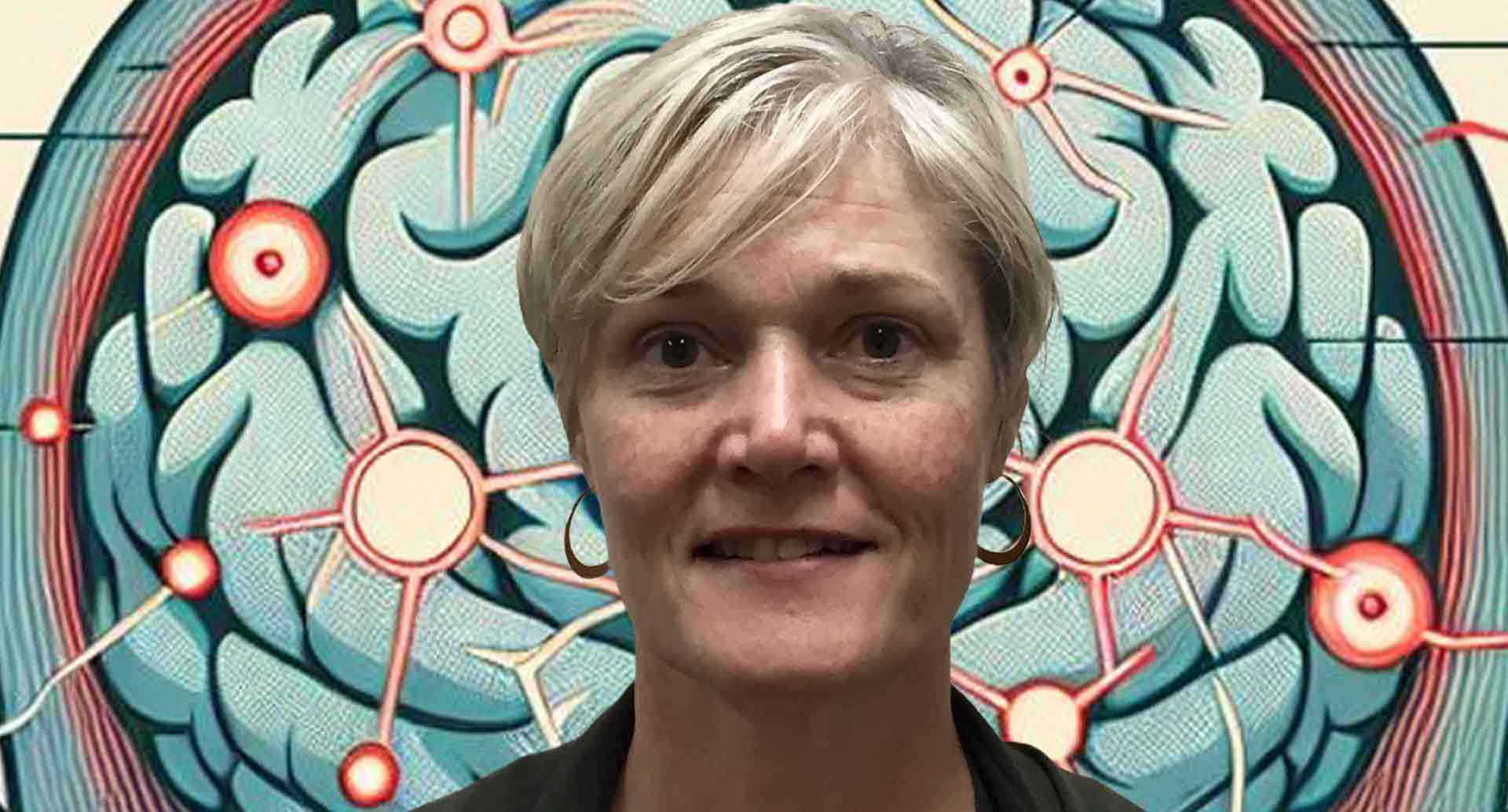
Dr. R Jane McKay is a clinical associate professor General Internal Medicine University of British Columbia (UBC) in Canada in the British Columbia (BC) Division of General Internal Medicine . She has extensive experience in medical leadership , and was instrumental in developing the Post Covid Recovery Clinics in BC . She currently maintains a practice at St Paul’s Hospital, Vancouver, Canada . Her outpatient practice focuses on Long Covid . For 25 years has seen individuals with ME/CFS and Fibromyalgia . She is currently in practice with Dr. Ric Arseneau seeing people from all over BC with Long Covid, ME/CFS and Fibromyalgia.
January Long Covid Questions | Headaches and Dizziness:
Does Gravol help with long covid dizziness and nausea? Are there any medications we can take to help that don’t have long term side effects. This is for my teenager. (CLICK TO VIEW ANSWER)
The symptoms of dizziness and nausea in long Covid should be addressed separately.
Dizziness can have many meanings, includes symptoms of light-headedness, loss of balance, a sensation of the room spinning, a sense of floating or heavy headedness.
Gravol, or Dimenhydrinate is not an effective treatment for dizziness .
Physiotherapy or Occupational therapy can be a helpful method of managing dizziness.
Nausea in Long Covid is a common gastrointestinal symptom. Unfortunately, Gravol can make this worse as it slows the gastrointestinal tract down as a side effect. This leads to a slower stomach emptying and continued nausea. Ideally start with adequate hydration and small frequent meals throughout the day. A low inflammatory diet such as the Mediterranean Diet is recommended. Avoid over the counter medications.
Prescription medications for symptom management of dizziness and nausea can be discussed with your health care provider.
My imbalance has gotten so bad that it’s hard to stand up without starting to fall. It seems to be progressing. I have seen neurologists, but they just don’t seem to have any answers. What helps with imbalance? (CLICK TO VIEW ANSWER)
Difficulty with movement and balance occur in long Covid because of the COVID virus changing how the nervous system sends signals from the brain to your muscles and nerves that control movement and balance. There are no medications available to treat this problem yet. The problem can worsen over time if there are significant activity limitations leading to increasing muscle weakness.
Assessment of your standing and walking by a physiotherapist and or an occupational will help determine what mobility changes and aids may be needed to keep you from falling, as well as strategies to improve your muscle strength which will significantly improve balance.
Often, I feel like my brain, or something in my head is swelling is this possible? (CLICK TO VIEW ANSWER)
In Long COVID, nerves in the head and neck may be altered. This change will cause nerve signals going to your brain sensory cortex (the area where our brain interprets sensations such as touch or swelling). The feeling of your head swelling is coming from altered nervous signals to your brain.
Your brain does not swell with Long COVID.
I do get headaches, but my breathing is a problem. I also get dizziness and severe congestion. I went to a Long-Haul clinic, and he wants me to try NAC and a nicotine patch. I have severe asthma and allergies so I’m hesitant on both for treatment.
What are your thoughts in NAC and nicotine patches? (CLICK TO VIEW ANSWER)
Nicotine patches have been studied in Long COVID. A study published in January 2023 created a lot of interest in using nicotine patches for Long COVID. The study hypothesis was nicotine patch could displace a portion of the SARS-CoV-2 blocking an important part of the nervous system responsible for fine tuning or neuromodulation of brain and nerves responsible for control of sleep, fatigue, nutritional behavior, anxiety, cognitive function and pain processing. The study was very small with only 4 participants. The smallest patch available 7.5 mg /24 hr was applied daily in the morning. The study lasted just under a month, and the 4 participants noticed improvement in fatigue, weakness, breathlessness, exercise intolerance, improvement in taste and smell, less chest tightness and palpitations as well as other symptom improvement.
With using any therapy, such as a nicotine patch for Long COVID it is always a risk versus benefit discussion. In the small study discussed there was benefit. The cost and potential side effects of using the smallest nicotine patch need to be considered.
NAC or N Acetyl Cysteine is an antioxidant, in a small study in Long COVID together with another medication it was found to help with memory, multitasking abilities and organizational skills. The dose in the study was 600 mg daily. It is used in lung diseases under guidance with your physician.
I’ve seen lots of doctors, specialists, functional medicine practitioners; I can’t seem to find answers for over 2 years. I have unexplained facial swelling, awful headaches and lots of other symptoms. Why medically would this be happening? (CLICK TO VIEW ANSWER)
In Long COVID headaches occur. There are 3 types of headaches including tension-type headaches, migraine-like headaches, and new daily persistent headache . The headaches that occur in Long COVID are due to 4 current hypotheses : trigeminovascular system activation, persistent activation of the immune system, prior history of headaches and changes in the grey and white matter connectivity of the brain . Hopefully, in the future these hypotheses will look towards treatment unique to the Long COVID headache type.
Currently recommendations for management of Long COVID related headaches is the same for the headache types that occur as mentioned. On the LONG COVID THE ANSWERS website there is an excellent section on headaches to read that may help https://longcovidtheanswers.com/migraines-in-long-covid/
Facial swelling can occur after viral infections, or with allergies. It is not specific to Long COVID. A trial of a Long Acting non-sedating antihistamine may be helpful to determine if it is related to immune changes involving mast cells .
I’ve had daily persistent headaches for 3 years with zero days off. I have daily dizziness, dysautonomia, POTS, internal and external tremors, PEM, etc. I’ve just been approved for Botox for the migraines. The only thing I’m currently on is methylene blue trying to heal my mitochondria. Is this a good course of action? Oral medicine for headaches gives me too many side effects. Currently it takes me about 2 hours to function each morning. Thank you for helping all of us! (CLICK TO VIEW ANSWER)
Methylene blue for mitochondria helps with “mitochondrial respiration “. It promotes effective mitochondrial activity and decreases “oxidative stress “. In doing so this improves many things such as fatigue and PEM. It has a neuroprotective effect so may help with your headaches. Methylene blue holds a lot of promise for mitochondrial health, and I would suggest continuing.
I suffer with balance, equilibrium issues, and shortness of breath. I also have zero sense of smell and minimal sense of taste. I am suffering from tinnitus that is getting worse and worse. What can I do? Thank you for your help. (CLICK TO VIEW ANSWER)
The symptom profile you have from Long COVID is involving your nervous system.
The balance and equilibrium concerns are happening due to the nerves from your brain to your muscles and the complicated relationship of the eyes and ears in maintaining balance and equilibrium.
Balance can be improved with physiotherapy specific treatments that help to retrain the eyes and ears as well as muscles that coordinate balance and movement.
An occupational therapist can help assist with determining the types of aids needed for your safety in an upright position. A cane, walker or wheelchair can give you so much freedom to live in the moment with your illness.
Tinnitus is a common neurologic problem in Long COVID. It can occur in up to 30 % of individuals with Long COVID. The nerves traveling to and from the ear are not working correctly. Your tinnitus may get worse at night. It can help to play background white noise; nature sounds or calming music through headphones. If the tinnitus is causing a lot of distress, mindfulness activities like deep breathing, or cyclic sighing may help.
The loss of taste and smell can persist in Long COVID. It represents the viral changes made to the olfactory and taste nerve cells. Trying to supplement with a multivitamin containing Zinc may help with taste. The recovery of taste and smell in Long COVID is variable and unpredictable.
Breathlessness with Long COVID is complex, some of it may be due to muscle fatigue of the small muscles between your ribs and diaphragm. If you had any lung changes with your initial COVID infection, that could contribute too. Changes to your autonomic nervous system occurring in up to 70 % of cases of Long COVID can change the balance of your parasympathetic and sympathetic nervous system. You may have a sensation of breathlessness, panic and a need to breath faster. One way to counteract this is by activation of your parasympathetic nervous system, the rest and digest portion of the autonomic nervous system. Deep breathing and breath control exercises can help you. Practice breath control exercises 3-4 times daily for 3-5 minutes each time. Cyclic Sighing is an excellent breath work exercise. With time 5 minutes of Cyclic Sighing can mimic the effects of 20 minutes of meditation.
I have sinus tachycardia since acquiring COVID-19 in July 2024. I take Ivabradine. What is my likely long-term prognosis and chances of recovery? (CLICK TO VIEW ANSWER)
Sinus tachycardia and other changes to the autonomic nervous system are common and frequent complications of Long COVID. Your infection is relatively recent, and there maybe improvement with time.
If you look at other populations such as those with Postural Orthostatic Tachycardia Syndrome not due to Long COVID the long-term prognosis is not known. The symptoms can be managed well with medication such as Ivabradine. Dysautonomia International is an excellent resource to review. It does have a lot of material on Long Covid dysautonomia.
Do you have any experience with epipharyngeal abrasive therapy? Do any doctors in Canada do this? Dr. Robert Groysman has had success with this for many Long COVID symptoms including head pressure/headaches. (CLICK TO VIEW ANSWER)
There is a study published on Epipharnygeal Abrasive Therapy (EAT) for Long COVID in 2022. 58 patients were treated with EAT once a week for a month which involves scrubbing the area with cotton immersed in a Zinc Chloride solution. EAT reduced inflammation in the epipharynx (the area at the back of your throat that lies between the nasal cavity and mouth area). The intensities of fatigue, headache and attention were decreased. This same study has been cited in many references to EAT therapy. There are places in the United States where this is offered as mentioned Dr Groysman. References checked have not identified a clinic in Canada providing this.
Please remember with all therapy consider, risk versus benefit and cost. A small study does show promise but may not help everyone with Long COVID.
I am an RN (Registered Nurse), I contracted COVID 3 years ago. Since then, I have a left-sided persistent headache around the eye area. I get migraines 3/4 times a week, triggered by noise or light (over stimulation). I also have left-sided tinnitus and slight hearing loss on the left side. I have tried so many conventional and alternative therapies. I am now under a headache consultant and tried Botox and now emgality. Do you know of any other treatments?? Have you any positive stories?? I believe it’s all to do with the nerves around the left eye. I did have a nerve block
above my eyebrow with nil effect. I am desperate to resolve this as I am on the verge of losing my job and may have to medically retire (I am 44yrs old / Female) Many thanks. (CLICK TO VIEW ANSWER)
Migraine-like headaches definitely occur in Long COVID. Despite existing hypotheses of the cause of Long COVID related headaches, it has not resulted in Long COVID specific therapies for migraine headaches triggered by Long COVID.
Your headache specialist is providing migraine related therapy including Botox and Emgality ( galcanezumab-gnlm) for once a month as a preventative therapy for your migraines. It is a very effective therapy and hopefully will bring you relief.
Tinnitus can occur in Long COVID, as can sensorineural hearing loss due to the effect of the virus in the inner ear and auditory nerve pathway.
Tinnitus is a common neurologic problem in Long COVID it can occur in up to 30 % of individuals with Long COVID. The nerves traveling to and from the ear are not working correctly. Your tinnitus may get worse at night. It can help to play background white noise; nature sounds or calming music through headphones. If the tinnitus is causing a lot of distress, mindfulness activities like deep breathing, or cyclic sighing may help.
Each time I’ve had COVID (3 times)I had these unique headaches. With Long COVID, I continue to have them off and on. I can find nothing to treat them. It seems they just go away on their own eventually. Do you have any treatment suggestions? (CLICK TO VIEW ANSWER)
Both acute COVID infection and Long COVID are associated with headaches. Prevention of another COVID infection with preventative measures is crucial in decreasing your risk of worsening headaches. With Long Covid associated headaches it is important to determine the headache pattern. There are 3 types of headaches, tension type, new daily persistent, and migraine-like headaches. There is no Long COVID specific headache treatment as yet. Current recommendation is to treat the headache pattern as if it was a non-Long Covid related headache. I encourage you to review https://longcovidtheanswers.com/migraines-in-long-covid/.
This review is an excellent source of information for understanding Headaches in Long COVID.
Do you know of any doctors who are as qualified as you in managing Long COVID that are in Alberta (preferably Edmonton)? I have severe headaches from Long COVID, especially upon waking. (CLICK TO VIEW ANSWER)
The Alberta Long Covid Network has undergone changes in the last year. Dr Grace Lam, a physician and one of the organizers of the Long Covid Web 2nd Annual Symposium works in Edmonton. You will need to see if she is currently seeing individuals with Long Covid.
Since catching COVID 2.5 years ago I have been getting tension headaches which also results in blurred vision. Having had all the relevant brain scans and eye checks/scans, all was clear, so I’ve been prescribed amitriptyline. Are there additional options due to the known side effects of amitriptyline? Will they ever go away? (CLICK TO VIEW ANSWER)
Tension-type headaches are one of the types of headaches that can occur with Long COVID. Currently there are no Long COVID specific tension headache therapies. Tension- type headaches in Long COIVD are treated in the same way as all conventional tension headache therapies.
There are many therapeutic options for tension-type Headaches available. The Mayo Clinic Resources for Tension Headaches is a reference I recommend as the information is accurate and easily available.
Amitriptyline does have side effects that can limit its use. There are other therapeutic options with different side effects that can be used which will require a review with your primary health provider.
I have headaches and throbbing behind my eyes. In the morning, I feel good then around noon to supper time the throbbing and pressure starts and gets worse. It’s like that every day it’s so tiring. What can be done for that? I have been suffering since 2022. (CLICK TO VIEW ANSWER)
Headaches following Long COVID often become worse as the day progresses. The pain associated will definitely cause fatigue. Long COVID headaches presenting with throbbing and pressure are often tension-type headaches. There is no specific Long COVID tension type headache treatment yet.
Treatment of tension-type headaches involve both non-medication strategies and medications. In your situation, non-medication strategies may help with the intensity of the
headache as the day progresses. Breathing exercises done for 5 minutes 4 times daily can help. Taking rest breaks throughout the day where you add in energy repleting activities such as listening to enjoyable music will help.
Pacing throughout the day is a good strategy to decrease any symptom.
For medications for tension-type headaches, please see your health care practitioner to discuss.
Sick almost five years. Initially had severe headaches and dizziness. Now it seems to come in waves and appears related to severe PEM and awful chest feeling, almost like I have pneumonia, but I don’t. Can you offer any help for this and what exactly causes it? (CLICK TO VIEW ANSWER)
With Long Covid, it is crucial to pace and stay within your energy envelope. If you are experiencing Post exertional Malaise, it will come with prior symptoms of your Long Covid experience. The “sentinel symptoms” coming prior to PEM are important to recognize. The sentinel symptoms are the warning signal that you need to pay attention to activity level and step back and rest. When you pace and achieve consistency with less PEM, your chest pain headaches and dizziness will decrease. Once at the point of PEM which is also worsening of symptoms, medications may only act as an adjunct to give some symptom relief.
I get terrible head pressure and migraines (I think they are migraines, they only started after I got COVID in March 2020). I sometimes feel like something is seriously wrong, like I’m having a stroke or something, because the pain is so severe. Often when I stand up, a terrible pressure goes from the back of my head toward the top and I have to grab onto something because everything glitches and goes dark for a few seconds. How do I know if I should be calling 911? I’d hate to die of a stroke because I ignored the signs.
Headaches can be very severe and debilitating. It is important to clarify with your health care professional if this is a migraine headache. There are many well established strategies for migraine management, to decrease intensity and frequency. The concern of a stroke is understandable. I would suggest seeing your health care provider to discuss your headaches. There are excellent resources available online to help you with your journey. In my practice I use https://migrainecanada.org/ as a reference for clients.
I suffer from dizziness every single day for over a year now. Testing and scans all come back normal. I’ve seen ENT, neurologists, and of course my pcp. Any advice? We can’t find common triggers since it’s constant and this dizziness is debilitating. My life is so miserable and no one seems to have a “next step” or more ideas. (CLICK TO VIEW ANSWER)
Daily long-term dizziness can be debilitating and life changing. Normal tests do not mean Long Covid hasn’t altered the nervous system controlling the complex mechanism leading to the development of dizziness. Unfortunately, there is no Long Covid related dizziness treatment . Dizziness management starts with adequate fluid intake. If any nausea, small frequent meals of a low inflammatory diet may help. Make sure your environment is safe in case you are at risk of falls. Some individuals do receive benefit from vestibular retraining with physiotherapy. There are medications available to decrease the symptom burden, but they may not help. Reach out for a support group. Dizziness occurs in many all over the world. Having a community of support will help.
Are there better ways to deal with the symptoms of Long COVID, I.e. headaches, dizziness, chest pain muscle/joint pains? Whenever I consulted or got treated for these symptoms, I always got either just “it’s not a heart attack” or “it’s just anxiety or a panic attack”. I believe and feel that I got anxiety after I got COVID twice and these recurring symptoms are making the anxiety worse! (CLICK TO VIEW ANSWER)
Long Covid does cause long term headaches and dizziness. The nervous system is altered by the multiple mechanisms leading to Long COVID. At this time headaches and dizziness are managed as for other clients without Long COVID. For headaches, the type of headache is important to determine. There are 3 headache patterns; migraine, tension-type and new daily persistent headache. Each type of headache has a different strategy for management. Identifying the headache pattern is your first step with your health care provider.
Daily long-term dizziness can be debilitating and life changing. Normal tests do not mean Long Covid hasn’t altered the nervous system controlling the complex mechanism leading to the development of dizziness. Unfortunately, there is no Long Covid related dizziness treatment . Dizziness management starts with adequate fluid intake. If any nausea, small frequent meals of a low inflammatory diet may help. Make sure your environment is safe in case you are at risk of falls. Some individuals do receive benefit from vestibular retraining with physiotherapy. There are medications available to decrease the symptom burden, but they may not help. Reach out for a support group. Dizziness occurs in many all over the world. Having a community of support will help.
I would encourage you to look up the Mayo Clinic definition of Long COVID. You will find useful information on the psychiatric manifestations that occur due to Long COVID.
What is it about speaking that gives me headaches? How can I prevent them, aside from being silent?? (CLICK TO VIEW ANSWER)
Hypersensitivity to any sound can occur in Long COVID this can be a trigger for multiple symptoms especially in the nervous system. Modulating your voice may help.
Participating in this course may help. Longcovidtheanswers.com/recovery is a self-managed 4-part course developed by an Occupational Therapist whom we use in our government practices to rehabilitate longhaulers. It is available to people outside of BC, Canada who may not have access to this resource in their Country/State.
My now 17-year-old daughter has been diagnosed with Long COVID for 4-5 years. She is much better now but in periods of worsening she gets massive headaches (like a migraine and in the back of the head).
These past 4 years she’s been taking a lot of ibuprofen. She tried Naproxen for a few weeks, it helped but because of stomach pain and constipation she can’t take Naproxen. Is there any good medicine she should ask her doctor to try? (CLICK TO VIEW ANSWER)
Migraine headaches are common in Long COVID . Nonsteroidal Anti-inflammatory medication like Naproxen are helpful. If side effects occur, and the headaches are frequent, different classes of medication are useful. I would discuss with your health provider. Every country has a slightly different approach. In Canada, the resource https://migrainecanada.org/ is very a very helpful tool.
I’ve been having Long COVID migraines since November 2020. Along with the post exertional malaise, tinnitus, fatigue, vertigo, nausea etc. I’ve seen specialists and tried so many medications, and nothing has helped. I have been doing IV infusions every 3 months of Vyepti and still have had no relief! What can I do? My neurologist has no other ideas after this. (CLICK TO VIEW ANSWER)
The migraines associated with Long Covid are challenging. Your neurologist is treating with an agent you have mentioned that is for migraine prevention. The symptom complex of tinnitus, fatigue , vertigo and nausea are also features seen in Long Covid that may accompany migraines , but are managed differently than a migraine . Nausea is a frequent symptom of migraines. Vertigo can occur with migraines but less often.
The fatigue and PEM you experience may be worse with chronic pain. When medication management has reached its limit, we look to complementary managements. The group reference below will help.
https://longcovidtheanswers.com/recovery/ is a self-managed 4-part course developed by an Occupational Therapist whom we use in our government practices to rehabilitate longhaulers. It is available to people outside of BC, Canada who may not have access to this resource in their Country/Province or State
Please see my answers to previous questions about tinnitus and vertigo/dizziness.
What are the treatment options for Long Covid New Daily Persistent Headache? Please provide outside-the-box options, not the usual anti-depressant ones that I keep getting offered. Thanks (CLICK TO VIEW ANSWER)
Long COVID New Daily persistent headaches do not have any specific therapy recommendations. The management strategy is designed on current management strategies for new daily persistent headaches in any population.
New daily persistent headache has two subtypes: a self-limiting subtype that typically resolves within several months without therapy, and a refractory subtype that is resistant to aggressive treatment regimens.
This article below will help you look at options that are used for treatment resistant headaches. You can review and discuss with your health care provider.
https://thejournalofheadacheandpain.biomedcentral.com/articles/10.1186/s10194-019-1022-z
In addition, the Cleveland Clinic has an excellent review of New daily persistent headaches including classes of medication that I recommend . https://my.clevelandclinic.org/health/diseases/24098-new-daily-persistent-headache-ndph
We are starting to see different approaches to treatments in different places, e.g. Germany focuses on micro clots (anticoagulants) and clearing spike protein. I believe your clinic uses antihistamines and LDN for inflammation etc.. Both approaches seem to help with headaches and other symptoms like leg pain. Can I ask how you determine which approach to use? Also, headaches so often trigger nausea for my LC teen. What would you recommend for nausea? (CLICK TO VIEW ANSWER)
There are 6 leading hypotheses for Long COVID. Micro-clotting along with endothelial dysfunction, and viral persistence are 2 of the hypotheses. Different areas will approach therapeutic intervention differently.
Frequently, antihistamines are used as Mast Cell Activation Syndrome is known to occur more frequently in Long COVID. Antihistamines will block the histamine on the H-1 receptor of our cells, decreasing symptoms of Mast Cell Activation Syndrome.
Low Dose Naltrexone in small doses up to 4.5 mg in the gold standard study, a randomized controlled trial, has been demonstrated to decrease pain. The proposed mechanism of action is stabilization of microglial cells that form part of the immune system. Preventing breakdown of the microglial cell results in less proinflammatory cytokine release as well as increased endorphin release, there are other effects, but these are most pertinent.
Studies are ongoing in Long Covid with Low Dose Naltrexone. In an unpublished retrospective review of Low Dose Naltrexone done by myself looking at Fibromyalgia and ME/CFS – pain was decreased, brain fog improved, there was less fatigue, and improved sleep was observed.
Nausea with headaches needs review with your health provider as it can be a presentation of a migraine-like headache. I would encourage your teen to seek guidance from a health care provider first. All nausea associated with Long COVID is improved with adequate hydration, and frequent small meals. A low inflammatory diet such as the Mediterranean diet may help.
Thida Thant is a faculty psychiatrist at the University of Colorado Department of Psychiatry and is the Director of the UCH psychiatry consult service, the Psychiatric Consultation for the Medically Complex clinic, the Easy Consultation rural primary care consult program and the Assistant Chief of Service for the CU Medicine Psychiatry Community Practices.
December Expert
Dr Danilo Buonsenso MD PhD

My name is Danilo Buonsenso, I am a paediatrician with expertise in Pediatric Infectious Diseases, Lung Ultrasound, Pediatric Emergency Care and Global Health.
I completed my training and medical residency at The School of Pediatrics at the Catholic University of the Sacred Heart in Rome, Italy. I worked in the Pediatric Emergency Department of Bambino Gesù Children Hospital in rome from 2016 to 2018. In 2018 I joined the Department of Woman and Child Health and Public Health at Fondazione Policlinico Universitario, where I am still working as a paediatrician and leading services in Pediatric Infectious Diseases and Clinical Ultrasound. In 2021 concluded my PhD in Public Health and Biomolecular Sciences and, in 2022, the Post Graduate Diploma in Pediatric Infectious Diseases at Oxford University. I am now doing my Msc in Pediatric Infectious Diseases at Oxford University.
I daily practice in the fields of pediatric infectious diseases, lung ultrasound, and pediatric emergency care. The main area of clinical and research activities in pediatric infectious diseases is pediatric Tuberculosis; however, during the COVID-19 pandemic, my work included studies around the clinical impact of SARS-CoV-2 infection in children, from acute disease to MIS-C and Long Covid, as well the indirect impact of the pandemic on child well-being, education and mental health.
December Long Covid Questions | Kids:
What hope is there? Have you seen full recovery? Is there an age which you see the most improvement? (CLICK TO VIEW ANSWER)
Hi, yes, there is hope, and I have seen full recovery. Most stories are in my book as well. In my opinion adolescents have the highest chance to get better, particularly if treatments are not started years after the disease
Hello, how could we act to alert, communicate, train and bring together other pediatricians (throughout Europe) on the after-effects of Covid, which can worsen with each new contamination, and educate the population on transmission by aerosols? Too many doctors still seem to be unaware that children can be affected. There is far too much ignorance, denial and gaslighting, refusal of examinations (here in France in any case). Medical wandering and the psychiatrization of symptoms can be devastating… Voices like yours are very important, but still too few in number, it is regrettable. (CLICK TO VIEW ANSWER)
That is true, it is also difficult for me to explain this, given the growing and growing evidence we have in the field. Unfortunately conferences and science do not seem to be sufficient, as you said we are still too few, that is why for example I also wrote a book. I think patients’ organizations here can have a major role.
My child has POTS and I’m reading that we should increase daily salt. In another report, I read salt is harmful for children. What is your advice and how much is too much for an 80lb child? (CLICK TO VIEW ANSWER)
Agree with the salt, particularly in young children. In younger patients (what is the age here?) we don’t have specific cut offs. I prefer checking HRV and stand test, consider drinking a lot of water, ivabradin, compressive socks, and a general initial indication that main meals should taste a bit salty, but this only if hypovolaemic POTS
You’ve openly said that Long COVID in Children is an endothelial disease. What indicators do we need to look for, what tests can we do and how will that affect our children as they grow older? (CLICK TO VIEW ANSWER)
I said it is an endothelial inflammation, which in turn can activate platelets . We don’t have formal tests so far, in the most severe cases I empirically consider to use some anticoagulants with known protective effects on the endothelium, at low dosages
We are now in year 2 of zero sports and no family activities from fatigue and dysautonomia. If you had a magic wand, what one thing would you tell us to focus on to get us back to the life we had before? (CLICK TO VIEW ANSWER)
Hi, I don’t have a magic wand, unfortunately. I always say to families that I cannot promise full recovery, but I’ll try with the best of my knowledge to help the child and families stay better. My decisions are based on a case by case scenario, according to the main problems. Several pharmacological options can be considered, as well as pacing strategies. Most children can at least return to go out from home a live a quite life, this is the minimal goal, most of the time achievable. Maybe easier to discuss in an online consultation. Also, the book I wrote can help in understanding more what is going on and potential strategies.
November Expert
Professor Ric Arseneau
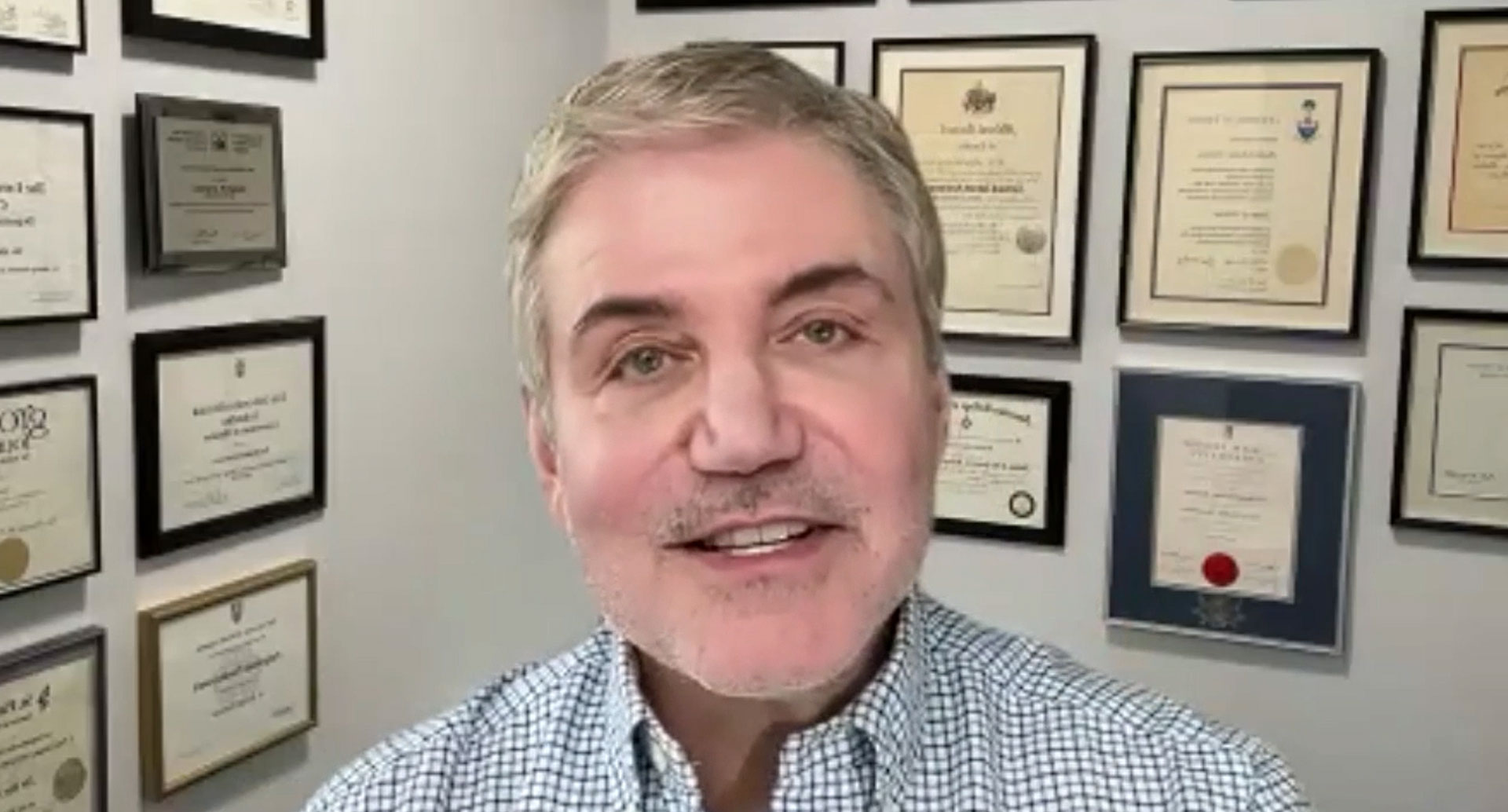
Professor Ric Arseneau, MD, FRCP, MA(ed), a Clinical Professor at the University of British Columbia in Vancouver, Canada and a specialist in Internal medicine with expertise in ME/CFS, Fibromyalgia and Long COVID. He was the Physician Lead for the Provincial ECHO Education Program for Long COVID in BC and was formerly the director of Program Planning of the BC Women’s Hospital Complex Chronic Diseases Program in Vancouver.
November Long Covid Questions | POTS and Dysautonomia:
Dizziness and increased heart rate when stand up – mild but worsened by PEM. Is this dysautonomia? (CLICK TO VIEW ANSWER)
Dysautonomia is DYS-function of the AUTONOMIC nervous system (i.e., fight or flight / adrenaline). There are different medical conditions that cause dysautonomia or are associated with dysautonomia. We will focus on the dysautonomia associated with ME/CFS and CSS (central sensitivity syndrome).
Autonomic Manifestations are part of the diagnostic criteria of ME/CFS and include:
- Orthostatic intolerance – lightheadedness or feeling like you’re going to faint on standing
- Postural Orthostatic Tachycardia Syndrome (POTS)
- Hypotension – low blood pressure
- Extreme pallor, nausea, and IBS
- Urinary frequency and bladder dysfunction
- Palpitations
- Shortness of breath or feeling like you can’t get enough air in
Symptoms of dysautonomia are also associated with other CSS: (e.g., fibromyalgia (FM), myofascial pain syndrome (MPS), POTS).
Interestingly, POTS is a separate CSS but is also used as part of the diagnostic criteria for diangosing ME/CFS. POTS can be thought of as a type of dysautonomia or a symptom of dysautonomia.
POTS is one of the common post-viral syndrome that we see with Long COVID. A study suggests that the POTS associated with Long COVID may be different in that it can be associated with low blood pressure. However, this study did not compare POTS in Long COVID with POTS in ME/CFS (unrelated to COVID). Low blood pressure is commonly seen in patients with ME/CFS who have POTS.
POTS is a disease of gravity. When patients go from lying to standing, the heart rate increases to compensate for gravity and ensure enough blood gets to the brain. However, the faster the heart beats, the less blood is pumped so rather than helping the patient gets lightheaded and may even faint. The classic manifestations of POTS are a heart rate that increases by 30 beats per minute or more from lying to standing WITHOUT a significant drop in blood pressure. Because low blood pressure can be seen with the POTS associated with Long COVID and ME/CFS, some physicians mistakenly think that the patient does not fulfil diagnostic criteria for POTS.
Is there any hope of remission or is it more or less symptom management forever?
Can you recover from POTS? (CLICK TO VIEW ANSWER)
Luckily, POTS is one of the post-viral syndromes associated with Long COVID that responds well to treatment. Many patients only require salt supplementation to improve the blood flow to the brain (i.e., 9 g per day). Otherwise, POTS also responds well to medication’s (e.g., beta blockers, Ivabradine, Mestinon) and other non-mediation options (e.g.,compression garments). Many patients find that their POTS symptoms improve with time and management of Long COVID.
What causes the low iron levels in ME/CFS? (CLICK TO VIEW ANSWER)
Low iron is not associated with ME/CFS or related CSS. Therefore, individuals with low iron (most commonly young women who menstruate) need to be evaluated for the cause of the low iron. Low iron itself (ferritin below 50) is associated with fatigue. Getting the ferritin above 50 can help with some of the fatigue but is not the cause of the ME/CFS.
Are there any tips or tricks to help your POTS symptoms when sick with a cold/flu? (High heart rate when lying down). (CLICK TO VIEW ANSWER)
If you are sick, you need to make sure to get plenty of rest and maintain your salt and fluid intake
To diagnose dysautonomia, your doctor will discuss your symptoms, perform a physical exam and may order tests, including diagnostic tests, blood tests and nerve or muscle biopsies’ – what exactly are they looking for in the blood tests and biopsies that mean you have dysautonomia? How can I ask my doctor to do these tests? (CLICK TO VIEW ANSWER)
The above is for other types of dysautonomia and I would not include it.
The diagnosis of dysautonomia in these conditions is based on symptoms without the need for special testing. However, dysautonomia can also be associated with other serious conditions (e.g., Parkinson’s disease) that may require special testing. The diagnosis of POTS itself is relatively straightforward. Many physicians mistakenly believe that patients require tilt-table testing to make a diagnosis. However, the NASA Lean Test Is more sensitive and more specific. The Canadian Cardiovascular Society Position Statement on POTS recommends against routinely performing tilt table testing.
The NASA Lean Test can be performed at home. Patient measure their heart rate before getting out of bed and for 10 minutes while leaning against a wall (there should be a spotter in case you feel faint). If the heart rate increases by 30 beats or more this is diagnostic of POTS. We recommend that the test be repeated on a separate day while measuring blood pressure to identify those patients who have a significant drop in blood pressure (or those whose blood pressure increases).
I have dysautonomia including POTS, gastroparesis and small fibre neuropathy from COVID and the gastroparesis is the worst. I’ve tried vagus nerve exercises but nothing is helping. Are we all just permanently damaged now? (CLICK TO VIEW ANSWER)
Gastroparesis (delayed gastric emptying), IBS with constipation, and constipation due to delayed transit time in the colon, can be associated with Long COVID and ME/CFS with or without POTS. We do not know the long-term history of these conditions due to the lack of research. However, the symptoms often respond to Mestinon. Small fibre neuropathy is commonly associated with ME/CFS, FM, and Long COVID. Again, we have a little data on the long-term prognosis. The symptoms, however, respond relatively well to the usual medication we use for neuropathic symptoms
Please talk about the benefit of SSRIs – Prozac, Paxil, Zoloft and the serotonin involved in the brain/and Dysautonomia/POTS connection. (CLICK TO VIEW ANSWER)
Long COVID is associated with low serotonin levels. Therefore many patients with Long COVID report some improvement with SSRIs (for those with associated pain we recommend SNRIs instead). However, the role of these medications in POTS remains unclear. Some studies suggest that it can help while others suggest that it makes symptoms worse. Therefore, SSRIs and SNRIs or not usually part of the usual treatment options for POTS. However, we commonly use these medication’s for other reasons in this patient population.
Should I get the vaccine if I’m unvaccinated and already have Long COVID with dysautonomia and established cardiac and metabolic sequelae? (CLICK TO VIEW ANSWER)
Before we answer this question, we need to make a distinction between Post Covid Conditions (PCC) and Long COVID which is a post-viral syndrome. Although a naming convention has not been agreed upon, we use the one by the Mayo Clinic in Rochester, Minnesota. They suggest that we think of PCC as anything that can happen after COVID which they organize into three groups:
- Tissue damage (e.g., lung scarring, heart damage, loss of taste or smell) and metabolic consequences (e.g., blood clots, high blood pressure, diabetes, high cholesterol)
- Psychiatric/psychological manifestations (e.g., depression, anxiety, PTSD)
- Post-viral syndrome – LONG COVID
Like the Mayo Clinic, we reserve the term Long COVID for those a post-viral syndrome in the absence of tissue damage. Many doctors and organizations do not make a distinction between PCC and Long COVID which is confusing and makes a lot of the medical literature difficult to interpret. Patients with post-viral syndrome of Long COVID tend to have completely normal bloodwork and investigations. However, special testing, which is not routinely available, does show many abnormalities.
The common post-viral syndrome associated with Long COVID include:
- ME/CFS
- FM
- POTS
- MCAS (mast cell activation syndrome)
Studies show that vaccination against COVID reduces the chances of “Long COVID” by 50% (this likely includes PCC). We can therefore assume that patients with pre-existing Long COVID are 50% less likely to experience significant worsening of their Long COVID symptoms. We encourage our patients to get vaccinated (except those who have had vaccine injury). A similar argument can be made for the use of Paxlovid and metformin during an acute bout of COVID in Long COVID patients
October Expert
DR THIDA THANT MD

October Long Covid Questions | Mental Health :
Thida Thant is a faculty psychiatrist at the University of Colorado Department of Psychiatry and is the Director of the UCH psychiatry consult service, the Psychiatric Consultation for the Medically Complex clinic, the Easy Consultation rural primary care consult program and the Assistant Chief of Service for the CU Medicine Psychiatry Community Practices.
Since 2020 she has begun to focus on the neuropsychiatric and psychological impact of COVID-19 infection through her role in the University of Colorado multi-disciplinary COVID clinic and overseeing the CU Department of Psychiatry’s Long-COVID Mental Health program.
Why are we always dismissed and told to see a psychiatrist when we have Long COVID? Are we being gaslit or is there something you can do to help all these physical symptoms that doctors can’t seem to understand? (CLICK TO VIEW ANSWER)
Many people with medical illness, including long COVID, can experience symptoms of depression, anxiety and sleep disturbance, either directly from the medical condition, associated symptoms such as pain or fatigue, the medications they are taking or the emotional and financial stress of dealing with poor health. Psychiatrists and therapists can help with these symptoms even if they are not the cause” of your physical symptoms and “medically unexplained” symptoms. Mental health professionals can also help with the emotional toll and trauma of having to navigate complex medical systems, having symptoms and concerns dismissed and fear related to the uncertain recovery timeline.
Even if mental health conditions are not causing your physical symptoms, it’s been shown that having active and untreated feelings of stress, depression and anxiety can exacerbate underlying medical conditions, which is particularly important for common long COVID symptoms such as fatigue, brain fog and headache that require comprehensive treatment approaches. In some areas and long COVID clinics, psychiatry is an important specialty in the management of symptoms like brain fog given their training in diagnostic evaluation of cognition, attention and mood, as well as their clinical expertise with some of the helpful psychiatric medications such as stimulants and antidepressants.
Our clinic developed this handout for friends and loved ones of long-haulers, though it may also be helpful when meeting with healthcare professionals less familiar with long COVID (in addition training programs such as this). Additional resources can include the CDC’s Living with Long COVID website..
How can a Long Hauler cultivate hope with the uncertainty of ever being healed? (CLICK TO VIEW ANSWER)
Finding a therapist that can provide Acceptance and Commitment Therapy (ACT), can be immensely helpful in learning ways to cultivate hope, enhance coping skills and find ways to lead a fulfilling and satisfying life that aligns with your personal values even in the setting of persistent physical symptoms.
Some steps that people find helpful are exploring ways to “lean into” and accept the uncertainty which often leads to decreased emotional distress (easier said than done I know!), identifying and focusing on what is within your control and cutting down on comparing your current functioning to your pre-illness self.
Some helpful ACT resources:
- https://positivepsychology.com/act-therapy/
- https://positivepsychology.com/act-acceptance-and-commitment-therapy/
Self-help ACT books:
· Get Out of Your Mind and Into Your Life: The New Acceptance and Commitment Therapy – Steven C. Hayes and Spencer Smith
· ACTivate Your Life: Using Acceptance and Mindfulness to Build a Life That Is Rich, Fulfilling and Fun – Joe Oliver, Jon Hill, and Eric Morris
· The Happiness Trap: How to Stop Struggling and Start Living – Russ Harris
Chronic illness toolkits like the one on my clinic website can also be helpful to work through on your own time if struggling to find an appropriate therapist:
Some other great articles and resources for this topic:
- https://returntowellness.co.uk/2019/03/13/10-things-to-do-when-your-recovery-is-uncertain/
- https://www.helpguide.org/wellness/health-conditions/coping-with-a-life-threatening-illness
- https://thehappinesstrap.com/free-resources/
Many people can be reassured by the knowledge that for many long-haulers, recovery can occur over the course of 6 months to several years, even if it slow and fluctuating in nature.
What’s the best way to support a child you care for in coping with the mental and emotional distress of missing activities and social situations, especially when there’s a lingering fear that this might become their permanent state? (CLICK TO VIEW ANSWER)
It can be helpful to reassure children that they are not alone in their experience and that in general children recover more quickly from long COVID than adults (an average of 6 months). When recovering from longer-term illnesses, much of our emotional distress comes from focusing on things we cannot control, things we have lost and feelings of uncertainty, which can make it hard to shift our attention to signs of improvement and progress and other fulfilling parts of our life.
Gratitude work, as well as the ACT resources mentioned in the other question about cultivating hope can be helpful in supporting your child.
They may also find it helpful to connect with other children and families experiencing long COVID. Long COVID Kids is an organization with extensive resources for families experiencing long COVID, including support groups and online “support packs” and guides!
Is there a connection between the manifestation of physical Long COVID symptoms and the onset of psychosis? (CLICK TO VIEW ANSWER)
Acute and long COVID have been associated with new onset psychosis as well as worsening of preexisting psychosis. The mechanism is not fully clear yet, but there have been multiple hypotheses identified, related to inflammation, side effects of medications like steroids, triggering of related medical conditions like encephalitis and the presence of concurrent hospital acquired delirium. For patients with new onset psychosis in the setting of COVID, it is often time-limited and may respond well to antipsychotic medication. More information can be found on our Long COVID the Answers Psychosis Symptom Page
Has bipolar disorder been found to have any form of association with Long COVID? (CLICK TO VIEW ANSWER)
Though not as commonly reported as depression, anxiety, PTSD and even psychosis, there have been some reports of bipolar type symptoms in the setting of COVID. Symptoms seem to occur more the acute illness phase and benefit from the same psychiatric medication as more classic bipolar I and II disorders such as antipsychotics, mood stabilizers and benzodiazepines.
Can epilepsy be a symptom of Long COVID and precipitate a psychotic episode or episodes? (CLICK TO VIEW ANSWER)
Epilepsy and long COVID have both separately been associated with symptoms of psychosis. Epilepsy has been reported as a possible result of COVID/long COVID, though in general it is felt to have a low incidence, with some studies citing an overall risk of 1% in all people with COVID-19. At this time, it is not known if epilepsy specifically due to long COVID can precipitate psychosis or psychotic episodes.
September Expert
PROFESSOR JAMES C. JACKSON
Professor Jim Jackson, an internationally renowned expert neuropsychologist specializing in cognitive rehabilitation and Long Covid. Prof Jackson directs Behavioral Health at Vanderbilt’s ICU Recovery Center and authored “Clearing the Fog: A Practical Guide to Long Covid.”

September Long Covid Questions | Brain Fog :
Do we know what physiologically is causing brain fog? (Click to view answer)
Brain fog is a very imprecise term but one that has made it way into our vocabulary. Many people with Long Covid use it and it refers to things like problems attending, focusing, processing. There are a huge array of potential contributors to brain fog which means that there is probably no single intervention that will completely alter or “fix” it. Physiologically, many experts think inflammation at at the heart of the matter but, again, there is no “one” cause.
Will games like sudoku help sharpen my brain while off work? (Click to view answer)
There is a vigorous debate going on pertaining how to best “sharpen” your brain. In general, experts believe that challenging your brain through moderately difficult activities – often things that are unusual or new and are reasonably demanding – is beneficial as it can help accelerate the process of neuroplasticity that is at work. In some cases, this can mean playing sudoku, in other cases, learning a language, or playing an instrument, and – perhaps – even engaging in some of the commercially available brain training programs which may help improve neuropsychological functioning.
When your mental health is poor and you feel isolated, lonely, tired and afraid – what would be the best way of managing these emotions. (Click to view answer)
I’m curious if there is a pattern of Long COVID mental health characteristics aligning very closely with PTSD, but more specifically the primary and secondary traits of PTS
There is no “one” way to best manage these difficult emotions except to say – don’t do it alone. Consider finding a mental health provider, a social worker, a member of the clergy or, really, anyone who can walk through deep water with you. You’ll be glad you did.
I have had mild covid brain occasionally. However, yesterday, I had a moment that was truly scary. I totally could not think of a word. Mind was a complete blank. I could picture the thing and could come up with other descriptors, but not the actual word. This was so frightening. What causes this?” (Click to view answer)
This experience – having a moment or two where your mind goes “blank” is a really terrifying phenomenon. This is a fairly common among people with mild cognitive impairments of various kinds and while it is distressing is is probably not proof of any more severe problem, though it does generate a great deal of anxiety which, ironically, usually makes this pattern even worse.
Is exposure therapy for long haulers for things like; light sensitivity and noise and other cognitive impairments helpful?
Or is it better to avoid stimuli that makes things cognitively worse until our brains heal? (Click to view answer)
Experts continue to debate how to best facilitate healing of injured brains. The key – as with almost everything – is to find a balance between engaging in activities and being exposed to stimuli that are too challenging and not engaging in activities at all. I think the most appropriate course of action – if at all possible – is to consult with a speech and language pathologist (SLP) – SLPs are the content experts who are the best guides and authorities on brain injury recovery – you can find one in any moderate or large city.
Is there a pattern of Long COVID mental health characteristics aligning very closely with PTSD, but more specifically the primary and secondary traits of PTSD? (Click to view answer)
Regarding PTSD, this is a syndrome that is very common in people with Long Covid – it may differ slightly than more typical PTSD in its’ presentation but, in general, it is very similar. In particular, people with Long Covid who have PTSD especially struggle with what is called medical avoidance – this is a concern because it leads them to miss appointments, avoid going to the ER or the hospital etc even when it medically called for. Treatments exist for PTSD, whatever the cause, and are highly effective – please considering seeking out a qualified provider who can help support you.
August Expert
PROFESSOR TODD DAVENPORT | PEM / PENE
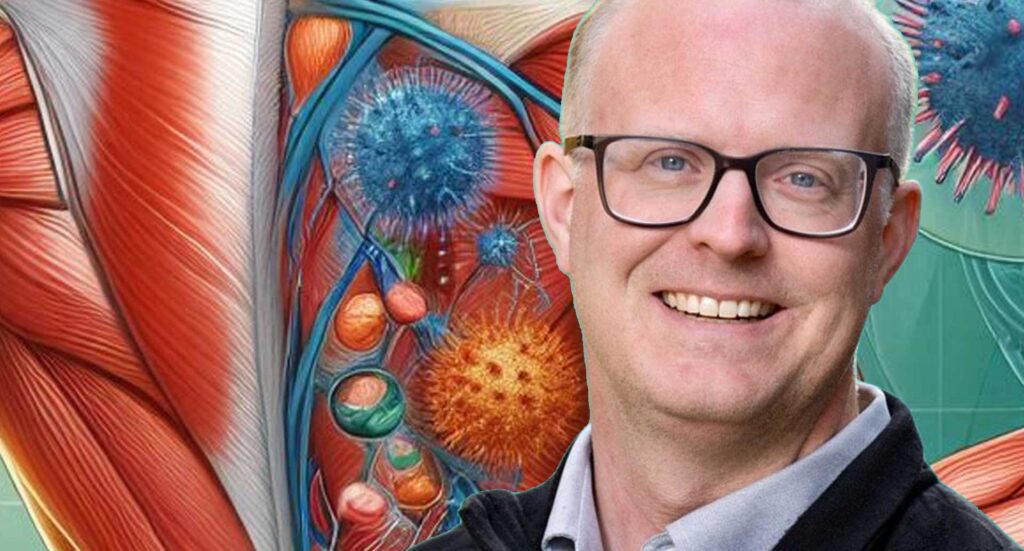
August Long Covid Questions | PEM (Post Exertional Malaise) :
Question: I can always tell when my son is about to have an energy crash. His skin turns a greenish tinge and becomes very pale, even though he’s still acting normal and energetic. The next day, he wakes up with only about 20% of his usual energy, and it takes days for him to recover to a decent energy level. What could this early skin warning be a sign of? How can we prevent an energy crash, especially in children who love to keep going when they’re having fun? (Click to view answer)
Answers:
- Skin changes are noted in some people with post-exertional malaise, including as a potential early warning sign. While no specific mechanism for changes in skin color has been show in the scientific literature, one possible explanation for this skin color change may be dysautonomia resulting in shunting of blood away from capillaries near the skin. Relatedly, small fiber neuropathy sometimes can result in a white or mottled red-white appearance.
- It’s so hard to help children pace when they’re feeling good and having fun, because it doesn’t feel like “help” for anyone involved. For ideas on pacing in children to prevent PEM crashes, I recommend the blog posts by Long Covid Kids on Cautious Tortoise and Pacing Penguins.
Question: What do you think of the hypothesis that Post-Exertional Malaise (PEM) is a conditioned immune response? (Click to view answer)
Answer:
It’s clear immune dysfunction is a part of PEM. However, any hypothesis explaining PEM must also explain the proximate cause of observed deficiencies in energy metabolism and consequent disablement. It’s perhaps more feasible that dysfunctional cellular energy production and utilization causes the characteristic immune dysfunction of PEM than the other way around. The fact that various studies have identified abnormal oxidative metabolism in various immune cells provides some support to this idea. A couple of models have been proposed to link metabolic and immune dysfunction, including the metabolic trap and itaconate shunt hypotheses. I look forward to more definitive data on these potential pathophysiological relationships that have relevance to treatment.
Question: I’m used to resting my bad back while reading or playing video games, but using my brain really drains me now…how do you spend your day not using your body or brain for most of it? (Click to view answer)
Answer:
Cognitive stressors are known precipitants of PEM crashes. However, neurocognitive pacing is such a huge challenge, especially for people whose jobs require significant brain usage; who enjoy reading, puzzles, and games; or who cultivate a vibrant internal world. Establishing time limits for reading, puzzles, and games and enforcing those limits with timers may help. Some people find meditation helpful to help turn down their thinking. Yoga nidra is a form of meditation that is accessible to people with PEM, because it is done while laying down in a “conscious sleep.” It’s also important to remember that different triggers are cumulative and may result in a crash. This means some people also find success with pacing activities that do not seem cognitive to build a reserve of capacity that can be used for cognitive activities. Pacing triggers such as physical activities and exposure to environmental stimulation also may help build a reserve that improves your cognitive symptoms and signs.
Question: I have moderate-sever post-exercise malaise and brain fog. I have gotten much better about managing energy and avoiding crashes, and I think some of my supplements are helping.
Here is what I am unsure about. If I can tolerate something without symptoms, should I do it and hope to build up tolerance, or is rest the most important? Do we know if exercise is harmful or helpful if it doesn’t cause symptoms?
For example, if I can do one strength workout a week without symptoms, but 2 causes symptoms or a crash, should I be doing one workout? Or none? (Click to view answer)
Answer:
- Pacing always involves balancing activities with rest. Even people without PEM pace their exercising! Early in managing PEM, the balance swings in favor of resting to manage symptoms and signs. Some people with Long Covid are able to return to some kind of physical activity without causing a PEM crash. Staying under the line of “just enough” and “too much” is particularly important for someone living with PEM, even if it is improving to the point that some exercise has become possible again, because future crashes are still possible.
- You are not going to exercise your way out of PEM by exercising more or harder. For someone with PEM, it’s still always better to do “a little too little” than “a little too much” physical activity. So, how can you find that line?
- Focus on short term activities: Short intervals minimizing time spent above your anaerobic threshold heart rate with complete rest are a good place to start. Starting with activities done laying down (like breathing, stretching, and limb movements) will reduce the work of the heart, improving preload and reducing orthostatic intolerance.
- Pay attention to how you feel: If you notice more PEM signs and symptoms after an exercise session, wait until they completely resolve for at least a couple of weeks before beginning again at a lower level.
- Watch your biometric data: An increasing resting heart rate and lowering heart rate variability at rest may suggest a crash in the near future, even if you’re feeling good.
- Maybe the hardest part of being able to do a little exercise is wanting to do more exercise. Remember: less is still more, be careful with yourself, and to keep up with what got you to this point.
Question:
Does post exertional malaise ever go away so you can exercise again? Or are people just having to pace their lives chronically? (Click to view answer)
Answer:
- This is an excellent question that gets my standard, universally unsatisfying response: maybe. Of course, my response isn’t to make light of a difficult conversation, but rather to highlight the uncertainty of this issue.
- Historically, most people with PEM related to ME/CFS have needed to pace over the long-term, because of a recovery rate of around 4-8% or less. Recovery is tricky to define and identify, because remissions may be temporary.
- Recovery rates for people with PEM related to Long Covid appear more promising, which suggests that at least some people are able to return to exercising in some form.
- We clinicians and researchers are still inaccurate at predicting who may improve, and recovery is non-linear when it happens. So, it is important to pace carefully while experiencing symptoms and signs of PEM, even if the capacity and desire for some more physical activity may be starting to come about.
Question: Is there an accepted supplementation regimen that has provided benefits? (Click to view answer)
Answer:
- Dietary supplements are a mainstay of PEM self-management. A recent systematic review and meta-analysis did not yield promising results from neutraceutical treatments for PEM related to ME/CFS. There are a number of challenges in studying neutraceutical treatments, including patient selection, potency and quality, adequate masking/placebo controls.
- While there is no widely accepted regimen, many people find neutraceutical treatments helpful that may reduce inflammation and support mitochondrial, immune, cognitive, circulatory, and digestive functioning.
- In this online lecture, Dr. Jeannette Brown goes through common over-the-counter dietary supplements and their potential uses for people with Long Covid. It is oriented more toward primary care practitioners, but there may be some information to which you can point your own medical team.
- Dr. Martha Eckey, and pharmacist living with Long Covid, has done the most extensive survey work to date regarding the use of neutraceutical treatments in Long Covid and ME/CFS. Her results may serve as a starting point to understand, on average, how often various treatments may or may not help.
- Before starting any new medication or dietary supplement, make sure to consult a physician or pharmacist who is knowledgeable about potential interactions between drugs and supplements to avoid side effects and toxicity.
Question: I get aching legs as part of my post-exertional malaise crashes. It’s not a sharp pain but just an all over ache. Is there anything to alleviate it? (Click to view answer)
Answer:
- I always recommend making sure aching legs aren’t associated with circulatory problems that are treatable, so make sure to check in with your medical team.
- Aching legs may be a sign of immediate or short-term PEM. While prevention is the best “medicine,” some people have success with self-treatments like elevation and gentle recovery compression.
Question: How do you get a diagnosis for PEM? (Click to view answer)
Answer:
- The diagnosis of PEM is usually made using basic information from asking questions and doing some basic medical tests. A digestible overview for identifying and evaluating potential PEM may be found in the paper by Grach et al. 2023. Perhaps the fullest case definition of PEM is the International Consensus Criteria for Myalgic Encephalomyelitis (ICC-ME), which was published in 2011 by Carruthers et al. In this case definition, you will find they don’t use the term PEM, but rather identify this phenomenon as post-exertional neuroimmune exhaustion, or PENE. The things I like about the ICC-ME are that it defines the post-exertional signs and symptoms comprehensively, distinguishes ME from atypical ME or idiopathic chronic fatigue, and comments on severity.
- Some people seek cardiopulmonary exercise testing (CPET) as part of the differential diagnosis of PEM and to document disability associated with it. People with PEM often have reduced aerobic capacity and workload at submaximal levels of exertion that are in line with the work of daily activities, which is worsened on the second day of a two-day CPET.
July Expert
Dr Daniel Griffin, MD PhD CTropMed CTH

July Long Covid Questions | Long COVID :
Question: Are there any predictive or early warning signs that an individual will be affected by Long COVID? (Click to view answer)
Answer: While who gets and who does not get Long COVID seems like the outcome of the lottery there are certain baseline characteristics that impact a person’s risk of getting Long COVID. While certain characteristics such as being hospitalized, female sex, higher body mass index, smoking, preexisting comorbidities, not receiving early antiviral therapy, and not being vaccinated are associated with an increased risk of Long COVID, sequelae of COVID-19 are seen in all populations are varying incidence levels.
EXPERT: Dr Daniel Griffin, MD PhD CTropMed CTH
Credentials:
Chief, Division of Infectious Disease and Travel Medicine | Optum / Tristate
Infectious Disease Specialist / Clinical Instructor of Medicine
Columbia University Vagelos College of Physicians and Surgeons
Department of Medicine-Division of Infectious Diseases
President –Parasites Without Borders
Question: Other than vaccination and masking what can individuals do to avoid Long COVID? (Click to view answer)
Answer:
While avoiding COVID-19 in the first place is the best way to prevent Long COVID, behavior modifications, masking, and improved ventilation can reduce the risk of exposure. Vaccines decrease the risk of developing Long-Term COVID-19 in adults, adolescents, and children. There has been some excitement about the possible impact of early use of metformin on the risk of developing Long COVID, but this requires a challenging regimen in the published trial and has not been repeated.
There is also uncertainty whether early treatment with an effective antiviral such as nirmatrelvir or molnupiravir may reduce the risk of all post covid conditions in people who are vaccinated, unvaccinated, boosted, and with primary and SARS-CoV-2 reinfection. Multiple studies have demonstrated that treatment of acute COVID-19 with nirmatrelvir-ritonavir can reduce the incidence of major adverse cardiac events (MACEs) (cardiovascular death, myocardial infarction, stroke, new-onset heart failure or heart failure hospitalization or ventricular arrhythmia).
Early treatment with nirmatrelvir-ritonavir during the first 5 days after symptoms onset is associated with not only major (reduction) in cardiac events and acute events such as hospitalization and death, but also a reduction in post-acute incidence of congestive heart failure, atrial fibrillation, coronary artery disease, chronic pulmonary disease, acute respiratory distress syndrome, interstitial lung disease, and end-stage renal disease.
Despite compelling data that monoclonal antibody therapy can have dramatic impacts on acute COVID-19 outcomes, our investigations looking at the ability of early monoclonal antibody therapy to prevent Long COVID have not been encouraging. While studies of the administration of monoclonal antibody therapy have not clearly demonstrated a reduction in the development of long-term COVID, early administration of COVID-19 convalescent plasma (CCP) has demonstrated a reduction in cytokine levels and a lower odds of development of post-COVID conditions. Corticosteroids may exert a protective effect against the development of post-COVID-19 syndromes if administered appropriately to hospitalized patients with acute COVID
EXPERT: Dr Daniel Griffin, MD PhD CTropMed CTH
Credentials:
Chief, Division of Infectious Disease and Travel Medicine | Optum / Tristate
Infectious Disease Specialist / Clinical Instructor of Medicine
Columbia University Vagelos College of Physicians and Surgeons
Department of Medicine-Division of Infectious Diseases
President –Parasites Without Borders
Question: Does Long COVID exacerbate neurological conditions such as Multiple Sclerosis? (Click to view answer)
Answer: Unfortunately, acute COVID-19, as well as Long COVID, can exacerbate many conditions, including MS.
EXPERT: Dr Daniel Griffin, MD PhD CTropMed CTH
Credentials:
Chief, Division of Infectious Disease and Travel Medicine | Optum / Tristate
Infectious Disease Specialist / Clinical Instructor of Medicine
Columbia University Vagelos College of Physicians and Surgeons
Department of Medicine-Division of Infectious Diseases
President –Parasites Without Borders
Question: When you have Long COVID, is it worth having your next vaccination or will it not be as effective? (Click to view answer)
One can open a discussion of evidence-based therapeutics for Long COVID-19 with optimism, as there are hundreds of ongoing clinical trials for Long COVID-19, the majority of which test potential therapies. Before its consideration as a therapeutic, there were questions about the safety of vaccinating patients with Long COVID symptoms. This was followed by evidence suggesting that COVID-19 vaccines had therapeutic benefits for patients with Long COVID if given after the development of Post-COVID sequelae. Vaccination has also been shown to reduce the severity and impact of Long COVID on patient’s social, professional, and family lives.
It appears that the benefits of COVID-19 vaccines on Long-COVID are present with a single vaccine dose but increases with a second and even more with a third dose of vaccine. COVID-19 vaccination in the context of PCC is associated with reduced symptoms, increased well-being, and downregulation of systemic markers of inflammation.
EXPERT: Dr Daniel Griffin, MD PhD CTropMed CTH
Credentials:
Chief, Division of Infectious Disease and Travel Medicine | Optum / Tristate
Infectious Disease Specialist / Clinical Instructor of Medicine
Columbia University Vagelos College of Physicians and Surgeons
Department of Medicine-Division of Infectious Diseases
President –Parasites Without Borders
July 2024 LONG COVID ANSWERS FROM EXPERT: Dr Daniel Griffin, MD PhD CTropMed CTH
Credentials:
Chief, Division of Infectious Disease and Travel Medicine | Optum / Tristate
Infectious Disease Specialist / Clinical Instructor of Medicine
Columbia University Vagelos College of Physicians and Surgeons
Department of Medicine-Division of Infectious Diseases
President –Parasites Without Borders




